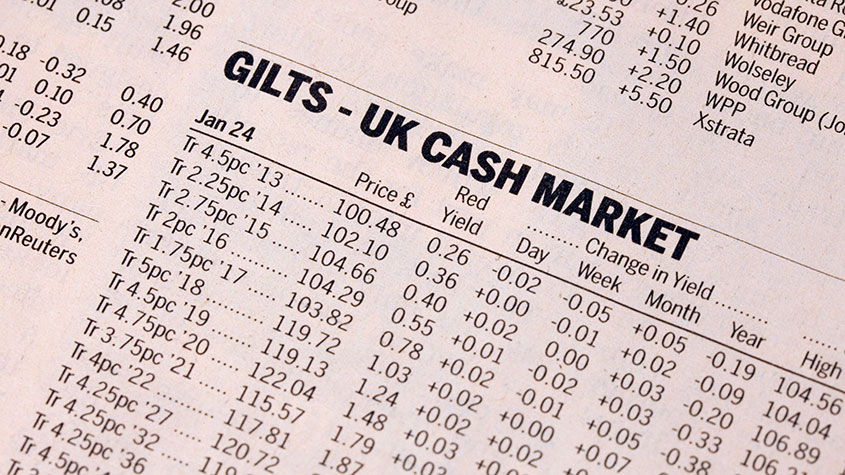Is it time to buy Gilts?
Gilts offer a higher yield than most savings accounts and could be an attractive alternative for those with a large lump sum to invest.


Get the latest financial news, insights and expert analysis from our award-winning MoneyWeek team, to help you understand what really matters when it comes to your finances.
You are now subscribed
Your newsletter sign-up was successful
Want to add more newsletters?

Twice daily
MoneyWeek
Get the latest financial news, insights and expert analysis from our award-winning MoneyWeek team, to help you understand what really matters when it comes to your finances.

Four times a week
Look After My Bills
Sign up to our free money-saving newsletter, filled with the latest news and expert advice to help you find the best tips and deals for managing your bills. Start saving today!
The Bank of England has hiked interest rates to 3% this year, as it attempts to control rampant inflation in the economy. It also looks as if the central bank is going to raise rates again when it meets on 15 December.
In general, higher interest rates mean that borrowing money becomes more expensive, which can discourage borrowing and spending, but they also make it more attractive to save money.
In fact, we’re seeing interest rates on savings accounts return to levels not seen since before the financial crisis as banks fight over our business.
MoneyWeek
Subscribe to MoneyWeek today and get your first six magazine issues absolutely FREE

Sign up to Money Morning
Don't miss the latest investment and personal finances news, market analysis, plus money-saving tips with our free twice-daily newsletter
Don't miss the latest investment and personal finances news, market analysis, plus money-saving tips with our free twice-daily newsletter
Interest rates on bonds are also on the up, which is good news for investors who’ve been starved of income over the past decade.
Why now could be the time to buy bonds
Interest rates and bond prices have an inverse relationship, meaning that when interest rates rise, bond prices fall, and when interest rates fall, bond prices rise.
This relationship exists because when interest rates increase, new bonds are issued at higher interest rates (commonly referred to as the bond yield), making existing bonds with lower interest rates less valuable. As a result, investors will be willing to pay a lower price for existing bonds with lower interest rates, causing their prices to fall.
Conversely, when interest rates decrease, new bonds are issued at lower interest rates, making existing bonds with higher interest rates more valuable. As a result, investors will be willing to pay a higher price for existing bonds with higher interest rates, causing their prices to rise.
Other factors also influence bond prices. According to Matthew Roche, Associate Investment Director at Killik & Co, “Sentiment is also a major driver of market movement.”
“When investors become more risk averse, they tend to demand higher returns from all assets, including bonds and gilts,” he says.
What are Gilts?
Gilts are bonds issued by the UK government. The term "gilt" refers to the fact that the bonds were originally issued with a gilt edge, meaning that the edges of the bond certificates were finished with a thin layer of gold.
Gilts are considered to be among the safest investments because they are backed by the full faith and credit of the UK government, which is considered to be highly creditworthy.
In September, the mini-budget triggered a huge sell-off of Gilts and yields (the interest rates paid on the bonds) surged.
As Roche points out, yields on 30-year Gilts “rose to a peak of 4.99% from just 1.1% at the beginning of the year.” While the market has since calmed down, yields remain elevated.
Investors can buy a 30-year Gilt today with an interest rate of 3.4%. That’s a lot better than the rate on most savings accounts - especially if you’ve got a large lump sum to invest.
Is it time to buy Gilts?
So, could this be a good time to buy Gilts for income?
“Currently, the bond yields on offer are proving tempting for many investors, particularly in comparison to holding cash, the value of which is still being eroded by inflation despite higher returns,” Roche notes.
With the risk of a recession also growing, bonds could be a “safe bet” for investors seeking income in times of uncertainty.
For many, high quality bonds could represent a good value source of income, especially if stock market investors are hit by recession as we’d expect – in times of financial crisis, many revert to buying bonds as a so-called ‘safe bet’.
“Furthermore, bonds can be held in tax wrappers, such as ISAs and SIPPs,” Roche notes and “Even when held outside tax wrappers, most bonds are not liable for Capital Gains Tax,” he adds.
These tax advantages could be significant for investors, especially when “bonds are purchased below the redemption price paid to the holder on the maturity of the bond.”
It could be time to buy bonds, but there are risks
Still, as is the case with any investment, there are still risks.
“Despite the relative return to calm, in the medium term, there is likely to be continuing volatility linked to market expectations of inflation and interest rate movement, and a related risk premium remains,” Roche notes.
What’s more, there’s a “dizzying array of corporate and government bonds with a range of names, maturities and coupon prices,” so it’s important investors know what they’re buying before getting involved with any particular security.
There are some other benefits of higher bond yields, which are also worth considering. “They will, in turn, boost yields elsewhere, such as annuities. That is potentially good news for savers and retirees, for example,” Roche summarises.
Get the latest financial news, insights and expert analysis from our award-winning MoneyWeek team, to help you understand what really matters when it comes to your finances.

Rupert is the former deputy digital editor of MoneyWeek. He's an active investor and has always been fascinated by the world of business and investing. His style has been heavily influenced by US investors Warren Buffett and Philip Carret. He is always looking for high-quality growth opportunities trading at a reasonable price, preferring cash generative businesses with strong balance sheets over blue-sky growth stocks.
Rupert has written for many UK and international publications including the Motley Fool, Gurufocus and ValueWalk, aimed at a range of readers; from the first timers to experienced high-net-worth individuals. Rupert has also founded and managed several businesses, including the New York-based hedge fund newsletter, Hidden Value Stocks. He has written over 20 ebooks and appeared as an expert commentator on the BBC World Service.
-
 How a ‘great view’ from your home can boost its value by 35%
How a ‘great view’ from your home can boost its value by 35%A house that comes with a picturesque backdrop could add tens of thousands of pounds to its asking price – but how does each region compare?
-
 What is a care fees annuity and how much does it cost?
What is a care fees annuity and how much does it cost?How we will be cared for in our later years – and how much we are willing to pay for it – are conversations best had as early as possible. One option to cover the cost is a care fees annuity. We look at the pros and cons.
-
 Why Scotland's proposed government bonds are a terrible investment
Why Scotland's proposed government bonds are a terrible investmentOpinion Politicians in Scotland pushing for “kilts” think it will strengthen the case for independence and boost financial credibility. It's more likely to backfire
-
 How have central banks evolved in the last century – and are they still fit for purpose?
How have central banks evolved in the last century – and are they still fit for purpose?The rise to power and dominance of the central banks has been a key theme in MoneyWeek in its 25 years. Has their rule been benign?
-
 Buying vs renting: is is better to own or rent your home?
Buying vs renting: is is better to own or rent your home?The higher mortgage rates of recent years have actually made renting comparatively cheaper, analysis suggests. But there are hidden costs to long term renting.
-
 Is Britain heading for a big debt crisis?
Is Britain heading for a big debt crisis?Opinion Things are not yet as bad as some reports have claimed. But they sure aren’t rosy either, says Julian Jessop
-
 Why investors can no longer trust traditional statistical indicators
Why investors can no longer trust traditional statistical indicatorsOpinion The statistical indicators and data investors have relied on for decades are no longer fit for purpose. It's time to move on, says Helen Thomas
-
 Bank of England resolves payments issue that threatened home sales
Bank of England resolves payments issue that threatened home salesNews Homebuyers and sellers faced an anxious wait for funds to clear on property transactions today due to issues hitting the Bank's CHAPS service.
-
 How will markets react to the next Bank of England rate decision?
How will markets react to the next Bank of England rate decision?The Bank of England is due to announce its latest interest rate decision on Thursday, 2nd November, but how will markets react?
-
 Halifax: House price slump continues as prices slide for the sixth consecutive month
Halifax: House price slump continues as prices slide for the sixth consecutive monthUK house prices fell again in September as buyers returned, but the slowdown was not as fast as anticipated, latest Halifax data shows. Where are house prices falling the most?